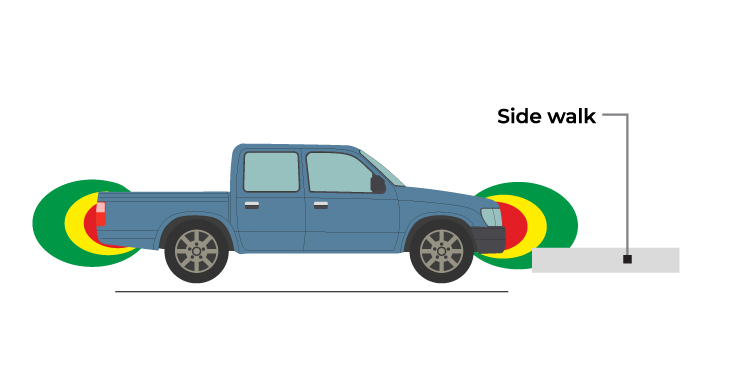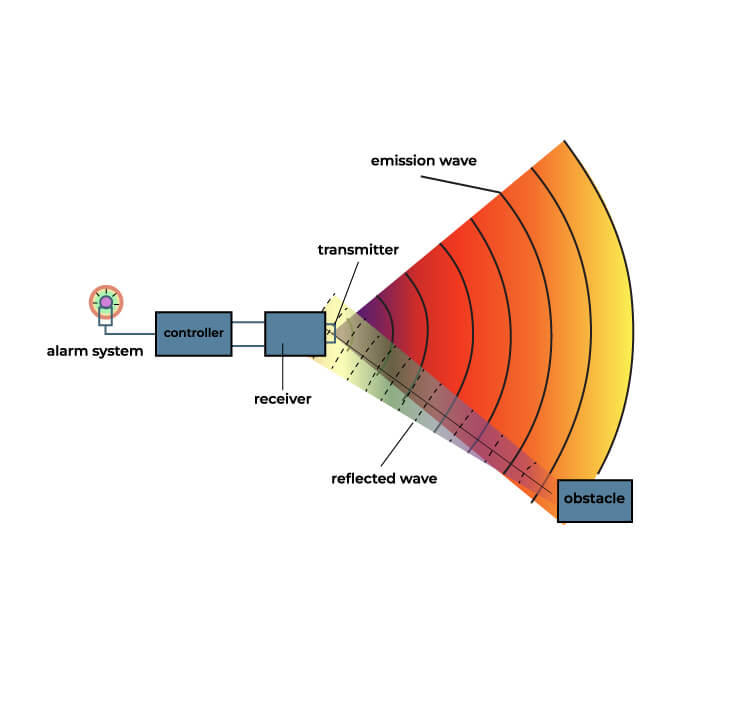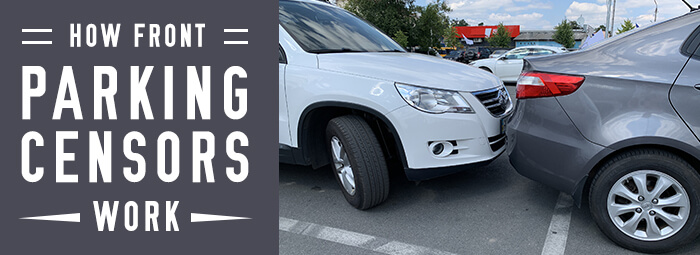For many people, parking sensors are a key safety feature of their car. They were actually precursors to front cameras but can still be an extremely useful (if annoying) safety feature.
Most newer cars come with some form of front parking sensor, but what exactly are they, and how do they work? Front parking sensors are designed to aid drivers in maneuvering by emitting a more frequent sound as the vehicle gets closer to an object. This system is usually activated automatically when the vehicle is placed in reverse but can also be turned on manually.

This article will take a deeper look at how parking sensors work. Let's get started, shall we?
How Does The Car Parking Sensor Work?
The parking sensor relies heavily on electromagnetic and ultrasonic sensor concepts for its operation. When the car is put into reverse, ultrasonic signals are sent from the parking sensors. When these signals are reflected off of the nearby object, the parking sensors pick them up again. Distance is determined by the time it takes for a signal to be sent and then recaptured by the engine control unit.

The alarm system sends an audio warning to the driver. This happens when the automobile is moving or approaching an item. Increasingly, automakers are including built-in cameras that provide a clear view of what's on both sides of the car.
Do Parking Sensors Detect People?
Most parking sensors will not detect people, as they are designed to detect objects that are stationary or moving very slowly. However, there are some newer models of parking sensors that do have the ability to detect people. These models usually use a different type of sensor, such as a radar sensor, to detect people.
Types Of Parking Sensors
Parking sensors are classified into two categories: Ultrasonic and Electromagnetic
Ultrasonic systems
These detectors are crucial for using high-frequency sound waves to locate objects. Sound pulses are generated by the sensors and reflected off of nearby objects. It uses a receiver to detect the reflected waves and calculate the distance between the vehicle and the target.
These sensors are often linked to an alarm system that sounds a warning to the driver if an obstruction is detected.
Using these sensors does come with certain limitations, such as:
- Smaller objects are not identified very often.
- Ultrasonic waves can't be replicated by some substances like tissue, plastic, or blood.
- A car's bumper houses several sensors; if they get covered with dust or dirt, they won't function correctly.
Electromagnetic Systems
Electromagnetic parking sensors employ electromagnetic frequencies to detect surrounding objects. These sensors detect a variety of wavelengths throughout the electromagnetic spectrum. As opposed to ultrasonic parking sensors, they are able to detect a wider variety of objects. Cameras may be included in these sensors to provide drivers with a better view of their surroundings and the road.
Ultrasonic and electromagnetic parking sensors are often built to communicate with one another while the vehicle is moving slowly or in reverse. While traveling forward at a fast enough pace, the infotainment system will automatically pause transmission.
How Do Aftermarket Front Parking Sensors Work?
Some of the finest aftermarket parking sensor kits employ radar waves that bounce off adjacent objects and then rebound to the sensors. Using this data, the gadget constructs a three-dimensional image of the area around the car and the items in it. When the car gets too near to anything, it sounds an alarm. These notifications may be audible, visible, or both, depending on the situation.
Do You Really Need Front Parking Sensors?
When it comes to safety features in your car, you can never have too many. This is especially true when it comes to features that help you avoid accidents. Front parking sensors are a great example of a safety feature that can help you avoid accidents, which makes them a great addition to your car.
When it comes to deciding whether you need front parking sensors, there isn't a straight answer. While most people would say those front parking sensors are a valuable safety feature that can be helpful in confined spaces, some people find them annoying and not always 100% accurate. So, the question is, do you really need front parking sensors?
If you frequently find yourself in tight spots or if you simply want an extra level of safety, then the answer is probably yes. However, if you rarely find yourself in situations where additional navigation help is necessary, then you may not need them. Ultimately, the decision is up to you.
Here are a few things to consider when deciding if front parking sensors are right for you:
- Do you have a lot of trouble with parallel parking?
- Do you frequently park in tight spots?
- Do you worry about hitting objects when backing up?
If you answered yes to any of the above questions, then front parking sensors may be a good investment for you. They can help you avoid accidents and will give you peace of mind when parking in a constricted space.
Conclusion
In conclusion, parking sensors can be a valuable safety feature for many drivers. While they are not 100% accurate, they can be beneficial in tight spots and can help avoid accidents. If you frequently find yourself in hard-to-navigate spots or worry about hitting objects when backing up, then front parking sensors may be a good investment for you.
If you are in the market for a backup camera, be sure to check out Camera Source. We carry only the highest quality products and stand by everything we sell. With a wide selection of cameras to choose from, we have the perfect one for your needs.








